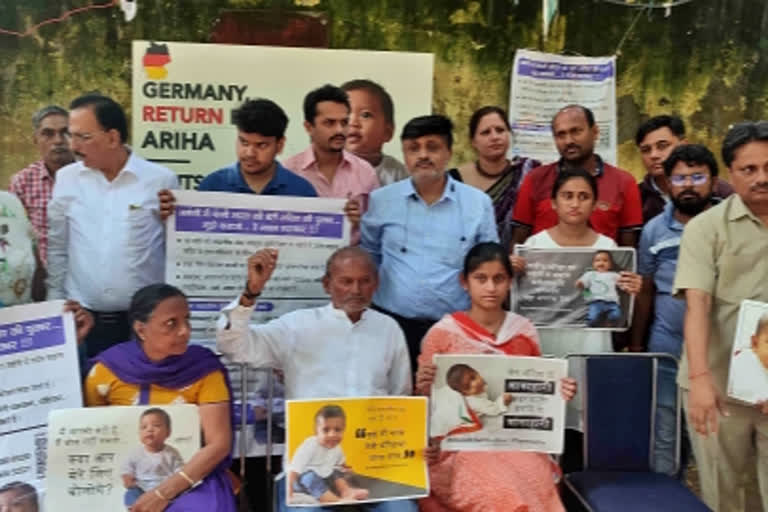New Delhi:A Gujarati couple— Dhara Shah and Bhavesh— is pleading with the Germany government to reunite with their 20-months-old daughter whom the child care officials have seized away charging the parents as unable to take care of the child. The baby was separated from the couple following an accident at home when she was seven-months-old. On Saturday, the child's relatives staged a protest in the national capital urging the German government to reunite the child with its parents.
In 2018, Dhara married Bhavesh, a Mumbai-based software engineer, and relocated to Berlin. The couple had a baby girl Ariha in 2020. In February 2021, the child got hurt while playing at home and the family took the child to a hospital where the child was treated and was sent home. Two days later, the family took the child back to the hospital for a review and the family was charged to have sexually assaulted the child.
Gujarati couple in Berlin pull all stops to get their daughter back from German officials The hospital had called the child care authorities who took the child away from the parents. The charges levelled by the hospital were dropped after a thorough investigation and medical examination. However, the child still remains in the government custody. The couple then started a legal battle for the custody of their child. Officials asked the parents that in order to get the custody of their child, they must get their DNA test done. A "fit-to-be-parents test" was also thrust upon the couple.
Also read:10-year-old boy sets out on journey alone to attend SP patriarch's funeral in Saifai
"We are pleading with the German government to hand over the child to a Jain Gujarati family where she can get vegetarian food and an appropriate environment, which is essential in her formative years" said Kinjal, maternal aunt of Ariha, and added "we fear that she may grow up speaking a foreign language as her mother tongue." The family had already petitioned the German government, and to the Ministry of External Affair and with the German Embassy in India, in this regard.
A Berlin— Stavanger parallel
The incident reminds of two siblings— Abhigyan and Aishwarya— children of a Bengali couple Sagarika and Anurup Bhattacharya who were similarly taken away by the Norwegian government and sent to foster care by the Child Protective Services. In May 2011 Abhigyan, then three years old, and his- then- one-year-old sister Aishwarya, were removed from their home in Stavanger, Norway, where they were living with their parents.
Aishwarya was only six months old at that time, and she was still being breastfed by her mother. They were first shifted to a temporary shelter and then placed in the care of two different homes, for ‘foster’ care. The problems for the Bhattacharya family began when teachers at the kindergarten school felt that Abhigyan was ‘distant’ (withdrawn, not very social), and had an ‘attachment disorder’. He was found to bang his hand on the floor as well.
Acting on the teachers’ observations, local child welfare authorities frequently visited the Bhattacharya home and observed the way the parents raised their children, for five months. They found that Sagarika used her hands (not fork and spoon) to feed her son; they also reportedly found that she did not have a diaper table for changing nappies. They opined that the mother was clinically depressed.
Child welfare authorities found it unacceptable that the boy (then two-and-a-half years old) slept in his father’s bed, and not in a separate one. They felt that the father was more committed to his work and official travel than to his children. Based on the report, both the children were taken from the parents by the Norwegian officials.
The incident had sparked a diplomatic row between India and Norway where the Indian government had told Norway that the ‘children were neither orphans, nor were they ‘stateless’ and sought their return. Finally, a court in Norway then allowed the children to return home on the condition that they would live with their father's brother, Arunabhash.
